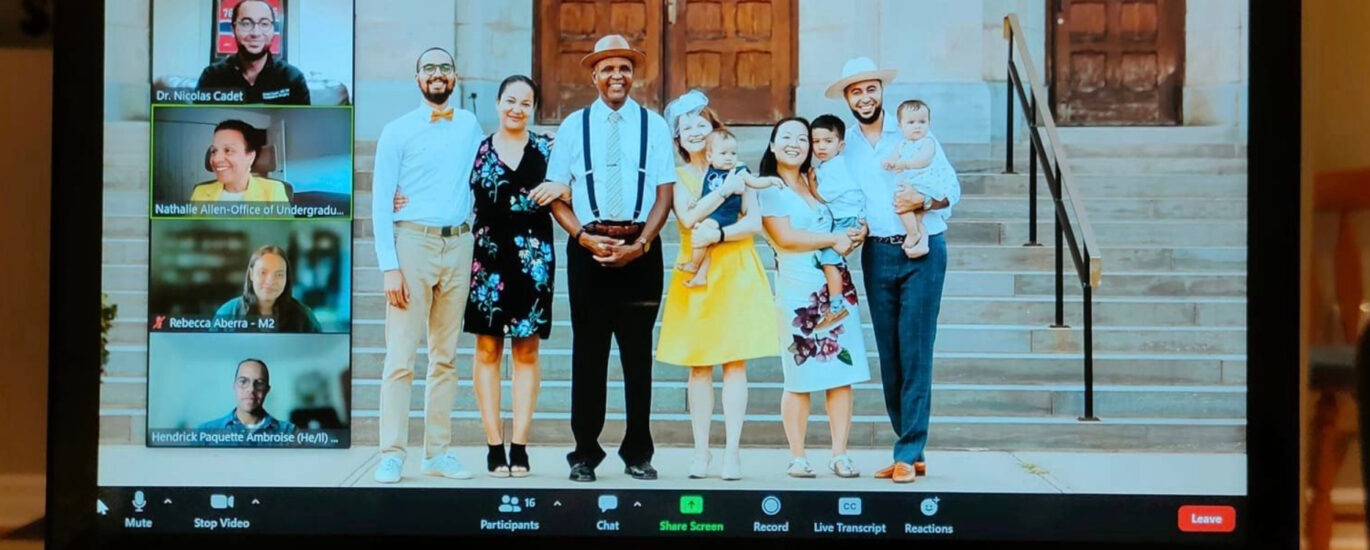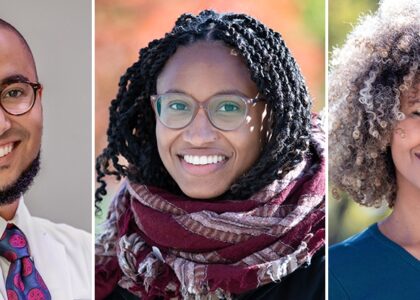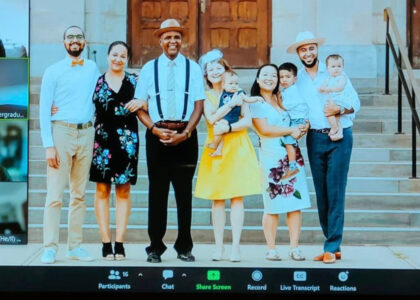Initiatives to increase the number of Black physicians are making headway at the School of Medicine, thanks to the dedicated efforts of many in the McGill communit
When Nicolas Cadet began his studies at McGill’s School of Medicine in 2008, he was one of six Black students in his class.
“I think it was the highest it had ever been. Normally, from what I heard, it was zero to four in most years,” says Cadet, MDCM’12, an ophthalmologist and oculoplastic surgeon in Montreal.
Cadet and his family have been actively working to increase the number of Black physicians. In 2021, he and his wife, Ji Wei Yang, MDCM’12, MedResident’17, along with his parents – Sylvie, a family physician, and Robespierre, a pastor who emigrated from Haiti as a young man – established the Cadet Foundation Bursary in McGill’s Faculty of Medicine and Health Sciences.
Concerted efforts by the Faculty and student leaders to address the under-representation of Black medical students are also making headway. Since fall 2022, about two dozen Black students have joined the School of Medicine each year. (In all, McGill admitted 218 students to its medical program in 2023-24, and 247 this academic year.) At present, including the pre-med year, there are about 75 Black medical students at McGill.
The Faculty’s Black Candidate Pathway, an application stream open to prospective pre-med and medical students from Quebec who identify as Black, launched for the 2022-23 academic year.
It’s a merit-based pathway, notes Dr. Anita Brown-Johnson, MDCM’88, PGME’90, Chief of Family Medicine at the McGill University Health Centre, who played an integral role in its development. “We were, in fact, adamant that the standards used from an academic perspective to admit students into the pathway would be no different from what was already established – and what had already been proven through rigorous research to predict success in medical school.”
“It’s all about removing historic barriers,” she says, and trying to level the playing field in terms of access to pertinent information for applying to medical school and mentorship.
“It’s the access to mentorship that has been the challenge, and that is not surprising because of the under-representation historically of the Black population in medicine,” she adds.
Prospective Black medical students can receive mentorship during the application process through the Community of Support Program at the Faculty’s Social Accountability and Community Engagement (SACE) Office. The student-led program matches Black applicants with current medical students who volunteer to answer questions about the application and interview process.
A sense of belonging
Divine Malenda, BScN’19, BSc(Kinesiology)’22, is one of six Cadet Foundation Bursary recipients to date.
In high school, she set her sights on becoming an obstetrician-gynecologist. “I didn’t get into medicine straight out of CEGEP, but I still wanted to do something that would get me in the field and get me working. So, I did nursing,” says Malenda, who also earned a degree in Kinesiology at McGill.
When she reapplied for admission into McGill’s School of Medicine through the newly created Black Candidate Pathway, Malenda also submitted the required personal statement that contextualizes an applicant’s life experience. She received mentoring from another medical student for the interview process, and was wait listed for admission, then accepted. She is now in her third year of Medicine.
As a Black medical student, did McGill feel like a welcoming place when she arrived?
“Oh my God, yes, it did. I think it’s because we were almost 25,” she says of the Black students in her class. “And Dr. Cadet did something amazing when we started.”
Cadet and his family sponsored a welcoming event at their cottage in 2022 for the Black medical students. “It was a great bonding moment,” says Malenda, who wiped away tears describing the event. “Already coming in as an older student, you’re like, OK, maybe I won’t find people that match with me and stuff like that. It was nice from the get-go. A lot of the Black students also had bachelor and master degrees…the connection was almost instant.”
At the gathering, the students wrote down ways to stay close as a unit. “Those rules were pretty simple, but they stuck with me because you could see that everybody cared and really wanted to have us stick together all the way through,” Malenda says. One rule she loved was to take notice of one another – in hallways, across rooms. “We acknowledge each other everywhere.”
The next year, the newly formed Black Medical Students’ Association began staging the welcoming event, which the Cadet Foundation continues to sponsor.
Cadet described his experience as a McGill medical student as a positive one. “The one thing that I’m glad to see now is that for Black medical students coming in there is that sense of them feeling welcome because of the community that’s already formed.”
‘Watershed moment in 2020’
Brown-Johnson notes that the Faculty was engaged in outreach efforts with the local Black community for many years, such as visiting high schools to tell students about opportunities in medicine.
However, it wasn’t until the “watershed moment in 2020” with the killing of George Floyd and the shocking death of Joyce Echaquan in a Quebec hospital, that institutions as a whole mobilized to focus on disparities among underrepresented populations, she says.
The Dr. Kenneth Melville McGill Black Faculty and Staff Caucus, of which Brown-Johnson is a founding member, collaborated with the Provost’s Office on McGill’s Action Plan to Address Anti-Black Racism, released in fall 2020.
As part of those efforts, the Faculty of Medicine and Health Sciences developed the Black Candidate Pathway. It was co-led in many ways by the student body, including then-medical student Victoire Kpadé, MDCM’22, and received tremendous input from the local Black community, says Brown-Johnson. “I was brought in as a consultant in that process and worked very closely with Dr. Saleem Razack [former director of SACE] and with now-Dr. Victoire Kpadé to bring it to fruition.”
Brown-Johnson says she is “quite pleased” with the initiative’s progress to date.
“I really feel most of all gratitude and a deep sense of satisfaction and hope in terms of the impact that I would expect this to have ultimately on the health of the Black community,” says Brown-Johnson. But also, its impact on all McGill’s physicians-in-training by virtue of studying together and exchanging knowledge. “I expect that there will be growth and better understanding of the needs of our communities,” she says.
For his part, Cadet eagerly anticipates seeing the Black medical network strengthen and grow in the future. “I think that that’s going to be great, not just for the medical students – the physicians themselves – but for sure for our communities and society as a whole.”






